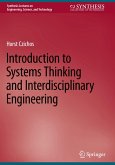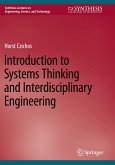Interdisciplinary and Social Nature of Engineering Practices
Philosophy, Examples and Approaches
Herausgegeben:Zambroni de Souza, Antonio Carlos; Verkerk, Maarten J.; Ribeiro, Paulo Fernando
Interdisciplinary and Social Nature of Engineering Practices
Philosophy, Examples and Approaches
Herausgegeben:Zambroni de Souza, Antonio Carlos; Verkerk, Maarten J.; Ribeiro, Paulo Fernando
- Gebundenes Buch
- Merkliste
- Auf die Merkliste
- Bewerten Bewerten
- Teilen
- Produkt teilen
- Produkterinnerung
- Produkterinnerung
This book covers practical and philosophical aspects of Engineering, paying special attention to the social impacts of emerging technologies. Some fundamentals of philosophy of technology are introduced followed by social, economic, and environmental discussion and implications in different disciplines. Each chapter provides insights on the responsibilities involved in the design of engineering projects. The examples presented combine concepts about the impacts of Engineering in society at the same time that incorporates new technological models, yielding an innovative approach about the topics.…mehr
Andere Kunden interessierten sich auch für
![Interdisciplinary and Social Nature of Engineering Practices Interdisciplinary and Social Nature of Engineering Practices]() Interdisciplinary and Social Nature of Engineering Practices131,99 €
Interdisciplinary and Social Nature of Engineering Practices131,99 €![Introduction to Systems Thinking and Interdisciplinary Engineering Introduction to Systems Thinking and Interdisciplinary Engineering]() Horst CzichosIntroduction to Systems Thinking and Interdisciplinary Engineering35,99 €
Horst CzichosIntroduction to Systems Thinking and Interdisciplinary Engineering35,99 €![Introduction to Systems Thinking and Interdisciplinary Engineering Introduction to Systems Thinking and Interdisciplinary Engineering]() Horst CzichosIntroduction to Systems Thinking and Interdisciplinary Engineering35,99 €
Horst CzichosIntroduction to Systems Thinking and Interdisciplinary Engineering35,99 €![Proceedings of the 3rd International and Interdisciplinary Conference on Image and Imagination Proceedings of the 3rd International and Interdisciplinary Conference on Image and Imagination]() Proceedings of the 3rd International and Interdisciplinary Conference on Image and Imagination306,99 €
Proceedings of the 3rd International and Interdisciplinary Conference on Image and Imagination306,99 €![The Importance of Soft Skills in Engineering and Engineering Education The Importance of Soft Skills in Engineering and Engineering Education]() Edoardo RovidaThe Importance of Soft Skills in Engineering and Engineering Education47,99 €
Edoardo RovidaThe Importance of Soft Skills in Engineering and Engineering Education47,99 €![Advanced Technologies, Systems, and Applications IV -Proceedings of the International Symposium on Innovative and Interdisciplinary Applications of Advanced Technologies (IAT 2019) Advanced Technologies, Systems, and Applications IV -Proceedings of the International Symposium on Innovative and Interdisciplinary Applications of Advanced Technologies (IAT 2019)]() Advanced Technologies, Systems, and Applications IV -Proceedings of the International Symposium on Innovative and Interdisciplinary Applications of Advanced Technologies (IAT 2019)116,99 €
Advanced Technologies, Systems, and Applications IV -Proceedings of the International Symposium on Innovative and Interdisciplinary Applications of Advanced Technologies (IAT 2019)116,99 €![Best Practices in Lean Manufacturing Best Practices in Lean Manufacturing]() José Roberto Díaz-RezaBest Practices in Lean Manufacturing58,84 €
José Roberto Díaz-RezaBest Practices in Lean Manufacturing58,84 €-
-
-
This book covers practical and philosophical aspects of Engineering, paying special attention to the social impacts of emerging technologies. Some fundamentals of philosophy of technology are introduced followed by social, economic, and environmental discussion and implications in different disciplines. Each chapter provides insights on the responsibilities involved in the design of engineering projects. The examples presented combine concepts about the impacts of Engineering in society at the same time that incorporates new technological models, yielding an innovative approach about the topics.
Produktdetails
- Produktdetails
- Studies in Applied Philosophy, Epistemology and Rational Ethics 61
- Verlag: Springer / Springer International Publishing / Springer, Berlin
- Artikelnr. des Verlages: 978-3-030-88015-6
- 1st edition 2022
- Seitenzahl: 460
- Erscheinungstermin: 16. Januar 2022
- Englisch
- Abmessung: 241mm x 160mm x 31mm
- Gewicht: 852g
- ISBN-13: 9783030880156
- ISBN-10: 303088015X
- Artikelnr.: 62470405
- Herstellerkennzeichnung Die Herstellerinformationen sind derzeit nicht verfügbar.
- Studies in Applied Philosophy, Epistemology and Rational Ethics 61
- Verlag: Springer / Springer International Publishing / Springer, Berlin
- Artikelnr. des Verlages: 978-3-030-88015-6
- 1st edition 2022
- Seitenzahl: 460
- Erscheinungstermin: 16. Januar 2022
- Englisch
- Abmessung: 241mm x 160mm x 31mm
- Gewicht: 852g
- ISBN-13: 9783030880156
- ISBN-10: 303088015X
- Artikelnr.: 62470405
- Herstellerkennzeichnung Die Herstellerinformationen sind derzeit nicht verfügbar.
A . C. Zambroni de Souza holds a degree in Electrical Engineering from the State University of Rio de Janeiro (1987), a Master's degree in Electrical Engineering from the Pontifical Catholic University of Rio de Janeiro (1990) and a PhD in Electrical Engineering - University of Waterloo Canada (1995). He is currently a full professor at the Federal University of Itajubá.He was a Visiting Professor (CAPES Scholarship) at the University of Wisconsin - Madison in 2000. In 2008 he was with the University of Strathclyde, Scotland. He acts in the area of stability of electrical systems, with special emphasis on the topic of voltage stability in transmission and distribution systems. As sub-topics, it works on voltage control and reactive power and analysis of electrical losses. Nowadays, his focus is on smart grids and smart cities, which includes the social effects of technologies. He is associate editor of the Journal of Control, Automation & Electrical Systems. Since 2015 he has been an Associate Editor of the Renewable Power Generation (IET-RPG) and of the IET Power Electronics, both under the coordination of The Institution of Engineering and Technology in the United Kingdom. He has served as a reviewer in national and international magazines and conferences. He is Fellow Member of the "IET - The Institution of Engineering and Technology", and has edited a book with Springer on "Microgrids Design". P.F. Ribeiro, holds a BS in Electrical Engineering from the Federal University of Pernambuco (1975), Diploma in Power Engineering from Power Technologies Inc., (PTI) 1979, Schenectady, New York, USA, PhD in Electrical Engineering - University of Manchester (1985), MBA from Lynchburg College, Virginia, USA (2000). He is currently a Full Professor at the Federal University of Itajubá, Itajubá, MG Brazil and was an Associate Professor at Technical University of Eindhoven, The Netherlands, and also taught at Virginia Tech University, Blacksburg, Va., Calvin College, Grand Rapids, Michigan. Professor Ribeiro was a Faculty Fellow at the NASA Research Center in Cleveland, Ohio, worked as a researcher at EPRI, Palo Alto, California, and served as an Erskine Fellow at the University of Canterbury, Christchurch, New Zealand. Professor Ribeiro is an IEEE Fellow, IET Fellow and Registered, PE in the State of Iowa, USA. His research interests include power systems, power electronics and power quality engineering, transmission systems, and superconducting magnetic energy storage systems, smart grids, engineering education and philosophy of technology. He is active with CIGRE, IEEE, and IEC Working Groups. He has published over 350 papers, several book chapters and four books.
Chapter 1: Introduction Complexity - Diversity - Coherence- Meaningfulness.- Chapter 2: Key Concepts for Frameworks: Values, Aspects, Normativity and Enkaptic Structures.- Chapter 3: Towards a Holistic Design for Engineering Infrastructures of the Future.- Chapter 4: The Social Dimension - Engineering and Social Welfare .- Chapter 5: Industrial Innovation Practices Breakthrough by Process Intensification.- Chapter 6: Renewables and Sustainability.- Chapter 7: Economics, Regulatory Aspects .- Chapter 8: Statistics and System Prediction.
Chapter 1: Introduction Complexity - Diversity - Coherence- Meaningfulness.- Chapter 2: Key Concepts for Frameworks: Values, Aspects, Normativity and Enkaptic Structures.- Chapter 3: Towards a Holistic Design for Engineering Infrastructures of the Future.- Chapter 4: The Social Dimension - Engineering and Social Welfare .- Chapter 5: Industrial Innovation Practices Breakthrough by Process Intensification.- Chapter 6: Renewables and Sustainability.- Chapter 7: Economics, Regulatory Aspects .- Chapter 8: Statistics and System Prediction.








